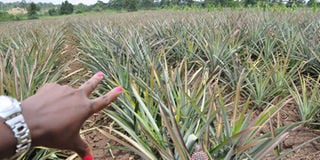Prime
Why does China want to farm in Africa?

A pineapple garden. The need for China to meet the demands of its high population has prompted the country to seek for alternative land for agriculture in African countries, including Uganda. PHOTO BY RACHEL MABALA
What you need to know:
Analysis. With China increasingly seeking land in many African countries, the Daily Monitor dissects the move, looking at the benefits and disadvantages.
Kampala. Until now, the Chinese in Uganda were known more for chasing after road, railway and hydropower construction projects.
But two weeks ago, this newspaper reported that the Ugandan government had given Chinese investors 750 acres of land in Masaka District to cultivate cotton.
Altogether, the Chinese want 17, 000 acres to cultivate cotton and for aquaculture.
Why now?
First, China is the world’s most populous country, with a total of 1.3 billion people, which is one–sixth of the world’s human population.
Because of high population, Chinese authorities from 1979 started “compelling” couples not to have more than one child.
A couple who produces more than one child pays a “social maintenance fee”, a fine.
The higher a couple’s income, the more it pays. If it fails to pay the fine, its extra child misses out on benefits such as free education.
Still, it becomes a challenge to feed such a huge a population.
Why is the government giving the Chinese land?
Dr Gabriel Ajedra, the state minister for Investment, says leasing land is one of the government’s policies of attracting investors to boost agricultural production.
He says most Ugandans who own land either lack the financial resources or interest to invest in agriculture. He adds that Uganda needs to add value to agricultural produce so as to boost export earnings.
This is something the Chinese can do, he says.
Why China wants land abroad
Dr Dambisa Moyo, a Zambian economist, in her book titled, “Winner Take All China’s Race for Resources And What It Means for Us”, says arable land in China is reducing.
This is due to the growth of urban centres and the pollution of the land.
“Less available land equals less domestic food production, and this equals significant food pressure. That is why China has embarked on aggressive land purchase and lease schemes well beyond its borders, particularly in fertile lands in Africa,” Dr Dambisa says.
“In…regions like Africa…land ownership remains concentrated in the hands of the state…it is far easier for China…to negotiate for access to…swathes of arable land with one controlling entity than [with] numerous small/individuals owners,” she adds.
The Global Hunger Index (2012) Report by the International Food Policy Research Institute, Concern Worldwide and Welt Hunger Hilfe attributes China’s quest for land outside its borders to food price spikes.
“…in response to food hikes, the number of…agricultural land deals have soared over the past five to 10 years. Many of the land leases have targeted Sub–Saharan Africa where land rents are cheaper and regulatory systems are weaker,” says the report.
How will Uganda benefit?
The Chinese will invest $300 million (Shs780 billion) over the next five years in cultivating cotton, in aquaculture and animal husbandry.
Ugandan officials say these will be massive investments that will create more job opportunities for many Ugandans. “The investments by Ugandan nationals are subsistence. They do not employ many people. Commercial agriculture will employ many people. Look at the sugar plantation in Jinja and see how many it has employed,” Dr Ajedra says.
Increasing job opportunities is commendable because according to an Action Aid Uganda (2012) report, six of every 10 Ugandans aged between 15 and 64 are unemployed.
Once people get jobs, they could support themselves financially. This reduces the likelihood of the–would–have–been unemployed turning riotous, which could create disorder.
Mr Okasai Opolot, the director crop production in the ministry of Agriculture, is quoted to have said it would guarantee Ugandan cotton farmers stable prices.
Because of its industrial and population growth, China will demand more and not less of the same quantities of produce.
So, Uganda will export much of the cotton and the fish to China to feed its textile industry and earn Uganda foreign exchange that it will need to pay for some of its imports.
Should Ugandans be concerned ABOUT CHINA?
There is mixed reaction to China seeking land for investment in Africa. “I don’t think anybody should have any stigma against that arrangement. What is important is how it modernises our agriculture because that is where our industrialisation will take off from,” says Mr Stephen Mukitale, the Member of Parliament for Buliisa.
However, Ms Susan Namaganda, the Woman representative for Bukomansimbi District, says the government decision is bad.
“Agriculture is supposed to be people-centred. But if you are considering the Chinese at the expense of Ugandans, then Ugandans will be slaves to the Chinese,” says Ms Namaganda.
Ms Beatrice Anywar, the Kitgum Woman MP, says the government might be fronting foreigners to grab land.
According to the National State of the Environment Report, 125, 000 sq. km or 62.5 per cent of Uganda’s land area is arable.
On the basis of the area of arable land, the population density is 283.2 persons per sq. km. So on average, each Ugandan has one acre (that is, 1 sq. km. = 247.1 acres. If you divide the 247 acres among the 283 people, each gets 1 acre).
Uganda’s population, however, is increasing by one million persons annually. Though the population is increasing, the land area is fixed.
China has not limited its search for land to Uganda. According to the Mo Ibrahim Foundation’s report titled, “African Agriculture: From Meeting Needs to Creating Wealth Report”, China has acquired 2.8 million hectares in the Democratic Republic of Congo and 101, 171 hectares in Zimbabwe.
Ms Flavia Munaaba, the state minister for Environment, when asked if her ministry is ready to handle the effects of commercial agriculture such as extensive water usage, said at the moment, local agribusinesses should be left to nationals.
“If they come here and plant bamboo and other crops that do not destroy the environment, I will say yes. But if it is clearing the vegetation that is already depleted, there is a problem. The sector should be left for the nationals,” Ms Munaaba said.
The report adds that the lack of transparency in the negotiations can foster corruption and the bargaining power is often on the side of the foreign companies.
Elsewhere
Last year, Tanzania put caps on the acreage of land that could be leased to investors. The maximum acreage it now leases out to a single investor for agricultural use is 10, 000 hectares.
For Uganda, Mr Mukitale says: “The cap should be commensurate to the amount of land required, the need – because different projects have different needs. Somebody might want to cultivate sisal, which needs a large expanse of land. Another person might not want a lot of land.”
KEY PLAYERS’ take
Gabriel Ajedra, state minister for Investment. “Leasing land to the Chinese for commercial agriculture is a good idea because they will produce on large scale, add value and export... Looking at their population alone, there is ready market.
Beatrice Anywar, Kitgum Woman MP. “Ugandans should watch out; I think there are some people in the government who are hiding behind the backs of foreigners to grab land’.
Flavia Munaaba, state minister for Environment. “If they come here and plant bamboo and other crops that do not destroy the environment, I will say yes. But if it is clearing the vegetation that is already depleted, there is a problem. The sector should be left for the nationals.”
THE NUMBERS
125,000 -Square kilo meters (30,887,500 acres) of Uganda’s land area that is is arable.
17,000- Acreage the Chinese want in Uganda.
1.3 billion -The total population of China
35.4 million- Uganda’s population according to the Uganda Bureau of Statistics report for 2013




